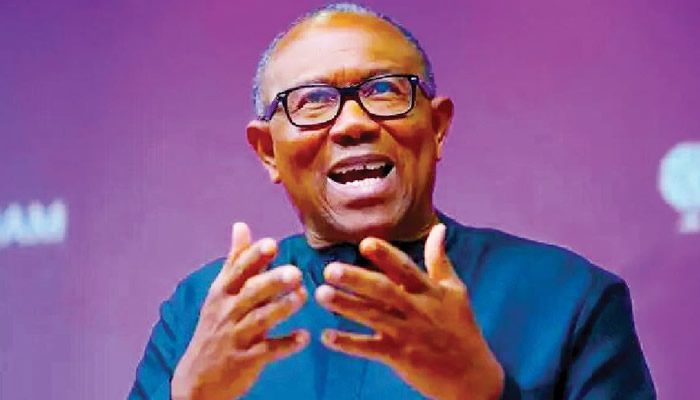The Nigerian political landscape is currently ablaze with accusations and counter-accusations following a controversial statement made by a spokesperson for the ruling All Progressives Congress (APC). The statement, perceived as a veiled threat against opposition presidential candidate Atiku Abubakar of the Peoples Democratic Party (PDP), has drawn sharp criticism from Atiku’s camp, the Labour Party (LP), and other political observers. The APC spokesperson, while ostensibly addressing issues of electoral integrity, used strong language that has been interpreted as an incitement to violence and a potential threat to Atiku’s life should he attempt to challenge the presidential election results. This incident has ignited a fierce debate about the tone of political discourse in Nigeria and the potential for inflammatory rhetoric to escalate tensions and incite unrest. The PDP and LP have called for the immediate retraction of the statement and a public apology, emphasizing the need for peaceful and respectful engagement in the democratic process.
Atiku Abubakar’s PDP has characterized the APC’s statement as a dangerous escalation of political rhetoric, a blatant attempt to intimidate the opposition, and a clear sign of desperation from a ruling party fearing electoral defeat. They argue that such pronouncements undermine the principles of democracy and threaten the peaceful transition of power. The PDP has emphasized Atiku’s commitment to pursuing legal and constitutional means to address any perceived electoral irregularities, asserting that the APC’s statement is an attempt to stifle legitimate dissent and discourage citizens from exercising their democratic rights. The party has also called on security agencies to take note of the inflammatory statement and ensure the safety of all candidates, especially Atiku Abubakar. Furthermore, the PDP has stressed the importance of maintaining peace and stability during the election period and has urged its supporters to remain calm and law-abiding while pursuing all available legal avenues to address their grievances.
The Labour Party (LP), whose candidate Peter Obi also contested the presidential election, has joined the chorus of condemnation against the APC’s controversial statement. The LP has expressed deep concern over the escalating tension and the potential for violence, arguing that such inflammatory rhetoric has no place in a democratic society. They have echoed the PDP’s call for a retraction and apology from the APC, emphasizing the need for responsible and respectful political engagement. The LP has also highlighted the importance of focusing on issues-based campaigns and avoiding personal attacks or inflammatory language that could incite violence. Furthermore, they have urged all political actors to prioritize national unity and stability and to work towards a peaceful and credible electoral process. The LP’s condemnation underscores the broader concern among opposition parties about the APC’s perceived attempt to suppress dissent and intimidate opposing voices.
The APC, in response to the widespread criticism, has attempted to clarify its spokesperson’s statement, claiming it was misinterpreted and taken out of context. They maintain that the statement was not intended as a threat against Atiku Abubakar or any other individual but rather a warning against any attempt to disrupt the peace or undermine the integrity of the electoral process. The APC has reaffirmed its commitment to peaceful and democratic processes, emphasizing its respect for the rule of law and the judiciary’s role in adjudicating electoral disputes. However, they have also accused the opposition parties of deliberately misconstruing the statement to gain political mileage and create unnecessary tension. The APC has urged all stakeholders to remain calm and allow the legal process to unfold, expressing confidence in the integrity of the electoral process and the eventual outcome.
This controversy has further polarized the political landscape, exacerbating existing tensions and fueling distrust between the ruling party and the opposition. It has raised serious concerns about the potential for violence and the need for greater responsibility in political communication. Civil society organizations and prominent individuals have called on all political actors to exercise restraint and engage in constructive dialogue to de-escalate the situation. They have emphasized the importance of upholding democratic principles and respecting the right of all citizens to express their views without fear of intimidation or violence. The incident underscores the fragility of Nigeria’s democracy and the critical need for peaceful and inclusive political participation.
The controversy surrounding the APC spokesperson’s statement has highlighted several critical issues within the Nigerian political landscape: the increasing use of inflammatory rhetoric, the potential for violence during election periods, the need for greater accountability and responsibility from political leaders, and the importance of safeguarding the integrity of democratic institutions. The incident serves as a stark reminder of the fragility of democratic progress and the constant need for vigilance and commitment to peaceful and inclusive political engagement. Moving forward, it is crucial for all stakeholders – political parties, candidates, security agencies, civil society organizations, and the media – to prioritize de-escalation, promote peaceful dialogue, and uphold the principles of democracy and the rule of law. The focus should be on ensuring a credible and peaceful electoral process that reflects the will of the Nigerian people and strengthens the country’s democratic institutions.


